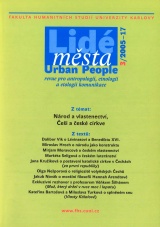Kontakty hornopolických poddaných s luteránstvím
(Příspěvek ke studiu nekatolictví v severních Čechách v 1. polovině 18. století)
DOI:
https://doi.org/10.14712/12128112.3870Abstrakt
Eastern outpost of the Czech Upland, passing suddenly onto foothills of Lužické Mountains, is a region where, following institution of the Toleration Patent in 1781, no Non-Catholic Church congregation was established. The nearest Lutheran congregation was established only at the beginning of 1784 near Úštěk, on the former Liběšice estate. In Habřina community, 204 German-speaking subjects were graciously allowed to establish their own chapel and to call up a minister despite the fact that the situation at Liběšice estate was far from the prescribed conditions required to establish tolerated congregation. In accordance with the actual Patent, a Non-Catholic congregation with it own chapel, own minister or even own school, was allowed to be established in localities where at least 100 families or 500 adult worshippers joined one of the tolerated denominations. Liběšice subjects were awarded an exemption based on justification that their remote location at the edge of Bohemia might prevent them from association with other groups of Non-Catholics and thus being unable to gather sufficient number of souls! Congregation in Habřina was the only tolerated congregation in the expansive region of Pokrušnohoří, Czech Upland and foothills of Lužické Mountains - regions that were at that time administrated by the Litoměřice District or the Litoměřice Diocese. The argument based on the remote location of the Liběšice estate, as well as the fact that there were only very few Non-Catholics allowed to establish officially tolerated congregations in the Litoměřice Diocese at the time of toleration, is surprising due to the strong Lutheran influence in the Northern Bohemian region prior to the Battle of White Mountain. At the end of the 18th century, the evangelical tradition in Bohemia certainly experienced more than 150 years of very consistent and cruel persecution with the intention to break religious continuity and persecute all non-conformists who were rejecting the new religious reality in the Habsburg lands following suppression of the Czech Estate Uprising and by extension the Peace of Westphalia. This harsh treatment by the Church and the State forced thousands of Non-Catholic subjects to leave their homes and flee to Saxony, Brandenburg, Poland and later to Prussian Silesia. This restriction, of course, applied to the entire country. Despite this restriction, Non-Catholicism survived underground in many Czech regions until the Toleration Patent was instituted.
Stahování
Publikováno
Jak citovat
Číslo
Sekce
Licence

Tato práce je licencována pod Mezinárodní licencí Creative Commons Attribution-NonCommercial-NoDerivatives 4.0.


